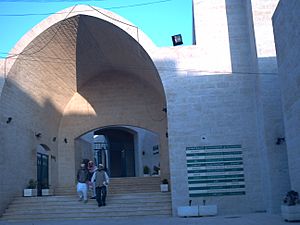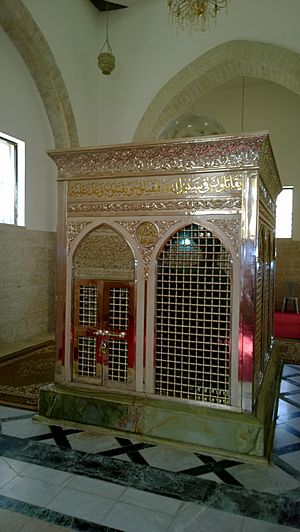Zayd ibn Haritha al-Kalbi facts for kids
Quick facts for kids Zayd ibn Ḥāritha al-Kalbīزيد بن حارثة الكلبي |
|
|---|---|
| Religion | Islam |
| Known for | Companion and adopted son of Muhammad |
| Personal | |
| Born | c. 581 CE Najd, Arabia (present-day KSA) |
| Died | c. 629 (aged 47–48) Mu'tah, Byzantine Empire (present-day Jordan) |
| Cause of death | Killed at the Battle of Mu'tah |
| Resting place | Al-Mazar, Mu'tah |
| Spouse |
|
| Children | Usama Zayd Ruqayya |
| Parents | Harithah ibn Sharahil (father) Suda bint Thaalaba (mother) |
| Relations | Banu Kalb (tribe) |
| Senior posting | |
| Rank | Military Commander (627–629) |
Zayd ibn Harithah (born around 581 CE, died 629 CE) was an important early Muslim and a close friend of the Islamic prophet, Muhammad. He is known as Muhammad's adopted son. Many people believe Zayd was the fourth person to accept Islam. Before him, only Muhammad's wife Khadija, his cousin Ali, and his friend Abu Bakr became Muslims.
Zayd was once a slave in Khadija's home. Later, Muhammad freed him and adopted him as his own son. Zayd also married two important women from Muhammad's household: his cousin Zaynab bint Jahsh and his mother's servant Umm Ayman.
Zayd became a leader in the early Muslim army. He led several military missions during Muhammad's lifetime. His last mission was in September 629 CE. He went to raid the Byzantine city of Bosra. However, the Muslim army met a large Byzantine force. Zayd was killed in this battle, known as the Battle of Mu'tah.
Contents
Zayd's Early Life
Zayd was born around 581 CE in a place called Najd, in central Arabia. He belonged to a tribe called the Kalb. His mother, Suda bint Thaalaba, was from another tribe called Tayy.
When Zayd was a young boy, he went with his mother to visit her family. While they were there, some horsemen from the Qayn tribe attacked their camp. They kidnapped Zayd and took him to a market called Ukkaz. There, they sold him as a slave for 400 dinars, which was a lot of money.
Zayd's family searched for him everywhere but could not find him. His father, Harithah, was very sad. He wrote a poem about his missing son:
I weep for Zayd, not knowing what became of him.
Is he alive, is he to be expected, or has Death come over him?
By God, I ask yet do not comprehend.
Was it the plain or the mountain that brought about your end?
I wish that I knew: Will you ever return?
In this world only for your coming back I yearn.
The sun reminds me of him when it dawns, evoking his memory as the dusk falls.
When the winds blow, they stir up memories like dust.
O how long my sorrow and fear for him last!
Zayd's Time as a Slave in Mecca
A merchant from Mecca named Hakim ibn Hizam bought Zayd. Hakim then gave Zayd as a gift to his aunt, Khadijah bint Khuwaylid. Zayd stayed with Khadijah until she married Muhammad. As a wedding gift, Khadijah gave Zayd to Muhammad. Muhammad grew very fond of Zayd and called him al-Ḥabīb, which means "the Beloved."
Years later, some people from Zayd's tribe came to Mecca for a pilgrimage. They saw Zayd and recognized him. Zayd asked them to take a message back to his family:
Carry a message from me to my people,
for I am far away, that close to the House and the places of pilgrimage I stay.
Let go of the grief that has deeply saddened you,
and do not hasten your camels all over the earth.
I live with the best of families, may God be blessed;
from father to son, of Ma'ad they are the noblest.
When Zayd's father and uncle received this message, they immediately traveled to Mecca. They found Muhammad at the Kaaba. They offered Muhammad any amount of money if he would return Zayd to them. Muhammad replied that Zayd should be allowed to choose for himself. He said if Zayd wanted to go home, Muhammad would free him without asking for any money.
They called Zayd, who easily recognized his father and uncle. But Zayd told them he did not want to leave Muhammad. He said, "I have seen something in this man, and I am not the kind of person who would ever choose anyone in preference to him." After hearing this, Muhammad took Zayd to the Kaaba. In front of everyone, he announced, "Witness that Zayd becomes my son, with mutual rights of inheritance." Zayd's father and uncle were happy with this and returned home without him.
From that day on, Zayd was known as "Zayd ibn Muhammad" (Zayd, son of Muhammad). He was a free man and was treated like Muhammad's own son.
Becoming a Muslim
Before the year 610, Zayd went with Muhammad to a city called Ta'if. It was a custom there to offer meat to idols. On their way back to Mecca, they met a man named Zayd ibn Amr. They offered him some cooked meat. Zayd ibn Amr, who believed in one God, said, "I do not eat anything you offer to your stone idols. I only eat food on which Allah's Name has been mentioned." After this meeting, Muhammad said he never again honored an idol.
When Muhammad announced in 610 that he had received messages from the angel Jibril (Gabriel), Zayd was one of the first people to become a Muslim. Khadijah was the very first Muslim. She was soon followed by her neighbor Lubaba, her four daughters, and then Ali, Zayd, and Abu Bakr.
The Journey to Medina
In 622, Zayd joined other Muslims on their journey, called the Hijrah, to Medina. Once they settled in Medina, Muhammad encouraged each Muslim to "take a brother in Religion." This meant each person would have a close friend and helper in the new community. Zayd was paired with Muhammad's uncle, Hamza. Hamza later trusted Zayd with his will before he died in 625.
A few months later, Muhammad and Abu Bakr sent Zayd back to Mecca. His job was to bring their families to Medina. The group returning to Medina included Muhammad's wife Sawda, his daughters Umm Kulthum and Fatimah, his servant Abu Rafi, Zayd's wife Baraka and their son Usama, Abu Bakr's wife Umm Rumman, and his children Asma, Abdullah, and Aisha. A guide and Abu Bakr's relative Talhah also joined them.
Zayd's Family Life
Zayd married several times and had three children.
- His son, Usama, was born to his wife Baraka (also known as Umm Ayman (Barakah)). Usama later had his own children and family.
- Zayd also had a son named Zayd and a daughter named Ruqayya with his wife Umm Kulthum. Sadly, both of these children died when they were very young.
Zayd's Military Missions
Zayd was known as a skilled archer among Muhammad's friends. He fought in important battles like Uhud, Trench, and Khaybar. He was also part of the journey to Hudaybiyyah. When Muhammad went on a raid to Al-Muraysi, he left Zayd in charge of Medina.
Zayd led seven military missions himself:
- Al-Qarada in November 624: He captured a group of goods, but most of the merchants escaped.
- Al-Jumum in September 627.
- Al-'Is in October 627.
- At-Taraf: A raid in the Nakhl area.
- Wadi al-Qura: Zayd raided this area in November 627. However, the Fazara tribe fought back, killing some Muslims and wounding Zayd. Zayd promised to get revenge. After he recovered in January 628, he returned to Wadi al-Qura with a bigger army and defeated the Fazara tribe.
- Hisma (or Khushayn) in October 628: This was against the Judham tribe.
- The Battle of Mu'tah in September 629: This is where Zayd was killed.
Aisha, Muhammad's wife, said that Muhammad always put Zayd in command of any army he sent out.
Zayd's Death at the Battle of Mu'tah
Zayd ibn Harithah led his last mission in September 629 CE. A Muslim army of 3,000 men went to raid the Byzantine city of Bosra. But a huge Byzantine army, said to be 200,000 strong, met them at a village called Mu'tah in present-day Jordan. Zayd carried the flag for the Muslim army in the battle. He was struck down by a spear and died. The other two leaders, Ja`far ibn Abī Tālib and `Abd Allāh ibn Rawāḥah, were also killed. The Muslim army then had to retreat.
When Muhammad heard about Zayd's death, he went to Zayd's family. Zayd's daughter cried, and Muhammad also cried until he sobbed. When someone asked him why he was crying so much, Muhammad replied, "This is the yearning of the lover for the beloved."
Images for kids
See also
 In Spanish: Zayd ibn Harithah para niños
In Spanish: Zayd ibn Harithah para niños
- Islamic adoptional jurisprudence
- Companions of the Prophet
- List of expeditions of Muhammad
- Expedition of Zayd ibn Harithah (disambiguation)





